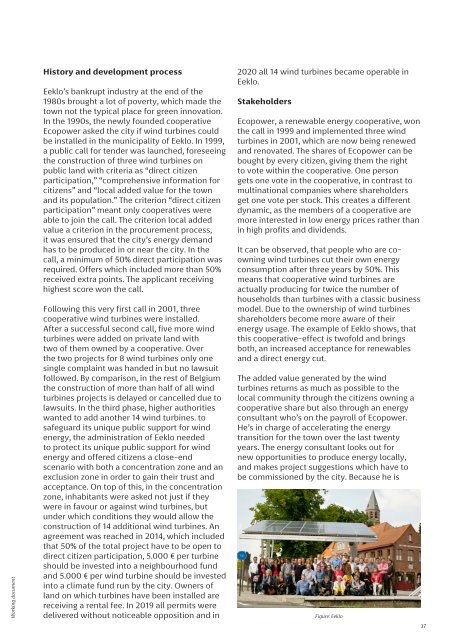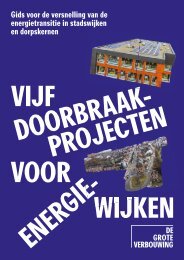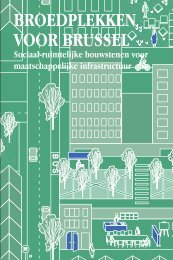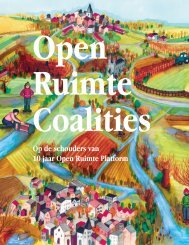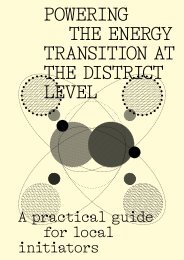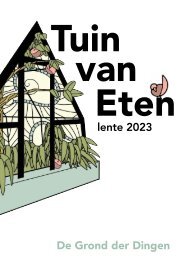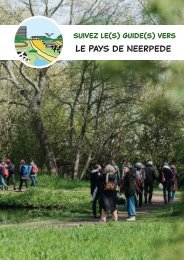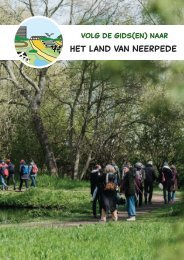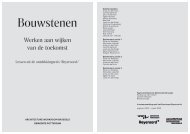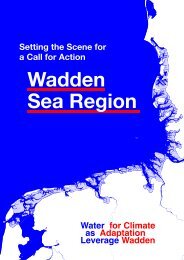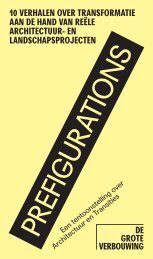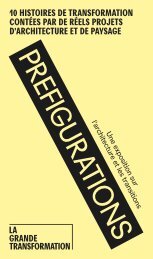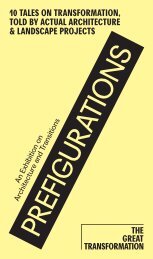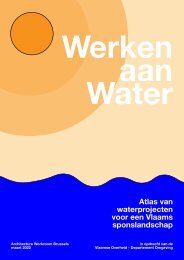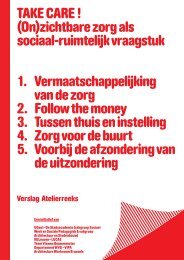Cities4PEDs Atlas_November 2021.pdf
Atlas - From 7 case interviews to recurring strategies and PED relevant aspects
Atlas - From 7 case interviews to recurring strategies and PED relevant aspects
- No tags were found...
Create successful ePaper yourself
Turn your PDF publications into a flip-book with our unique Google optimized e-Paper software.
Working document<br />
History and development process<br />
Eeklo’s bankrupt industry at the end of the<br />
1980s brought a lot of poverty, which made the<br />
town not the typical place for green innovation.<br />
In the 1990s, the newly founded cooperative<br />
Ecopower asked the city if wind turbines could<br />
be installed in the municipality of Eeklo. In 1999,<br />
a public call for tender was launched, foreseeing<br />
the construction of three wind turbines on<br />
public land with criteria as “direct citizen<br />
participation,” “comprehensive information for<br />
citizens” and “local added value for the town<br />
and its population.” The criterion “direct citizen<br />
participation” meant only cooperatives were<br />
able to join the call. The criterion local added<br />
value a criterion in the procurement process,<br />
it was ensured that the city’s energy demand<br />
has to be produced in or near the city. In the<br />
call, a minimum of 50% direct participation was<br />
required. Offers which included more than 50%<br />
received extra points. The applicant receiving<br />
highest score won the call.<br />
Following this very first call in 2001, three<br />
cooperative wind turbines were installed.<br />
After a successful second call, five more wind<br />
turbines were added on private land with<br />
two of them owned by a cooperative. Over<br />
the two projects for 8 wind turbines only one<br />
single complaint was handed in but no lawsuit<br />
followed. By comparison, in the rest of Belgium<br />
the construction of more than half of all wind<br />
turbines projects is delayed or cancelled due to<br />
lawsuits. In the third phase, higher authorities<br />
wanted to add another 14 wind turbines. to<br />
safeguard its unique public support for wind<br />
energy, the administration of Eeklo needed<br />
to protect its unique public support for wind<br />
energy and offered citizens a close-end<br />
scenario with both a concentration zone and an<br />
exclusion zone in order to gain their trust and<br />
acceptance. On top of this, in the concentration<br />
zone, inhabitants were asked not just if they<br />
were in favour or against wind turbines, but<br />
under which conditions they would allow the<br />
construction of 14 additional wind turbines. An<br />
agreement was reached in 2014, which included<br />
that 50% of the total project have to be open to<br />
direct citizen participation, 5.000 € per turbine<br />
should be invested into a neighbourhood fund<br />
and 5.000 € per wind turbine should be invested<br />
into a climate fund run by the city. Owners of<br />
land on which turbines have been installed are<br />
receiving a rental fee. In 2019 all permits were<br />
delivered without noticeable opposition and in<br />
2020 all 14 wind turbines became operable in<br />
Eeklo.<br />
Stakeholders<br />
Ecopower, a renewable energy cooperative, won<br />
the call in 1999 and implemented three wind<br />
turbines in 2001, which are now being renewed<br />
and renovated. The shares of Ecopower can be<br />
bought by every citizen, giving them the right<br />
to vote within the cooperative. One person<br />
gets one vote in the cooperative, in contrast to<br />
multinational companies where shareholders<br />
get one vote per stock. This creates a different<br />
dynamic, as the members of a cooperative are<br />
more interested in low energy prices rather than<br />
in high profits and dividends.<br />
It can be observed, that people who are coowning<br />
wind turbines cut their own energy<br />
consumption after three years by 50%. This<br />
means that cooperative wind turbines are<br />
actually producing for twice the number of<br />
households than turbines with a classic business<br />
model. Due to the ownership of wind turbines<br />
shareholders become more aware of their<br />
energy usage. The example of Eeklo shows, that<br />
this cooperative-effect is twofold and brings<br />
both, an increased acceptance for renewables<br />
and a direct energy cut.<br />
The added value generated by the wind<br />
turbines returns as much as possible to the<br />
local community through the citizens owning a<br />
cooperative share but also through an energy<br />
consultant who’s on the payroll of Ecopower.<br />
He’s in charge of accelerating the energy<br />
transition for the town over the last twenty<br />
years. The energy consultant looks out for<br />
new opportunities to produce energy locally,<br />
and makes project suggestions which have to<br />
be commissioned by the city. Because he is<br />
Figure: Eeklo<br />
37


